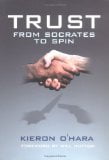 Trust: ..From Socrates to Spin
Trust: ..From Socrates to Spin
by Kieron O’Hara Icon Books, £12.99, ISBN 1 840446 531 X
Trust, as the author points out, is a universal component of human life, from the individual to multinational business and world government. Without it we simply could not function. We have to assume that most people will generally do what they say, even though all too often this is a matter of the triumph of hope over experience. (How many people told me, apropos the election of 1997, “This time it will be different”?)
Yet there are increasingly problems, O’Hara argues, resulting from too much or too little, or misplaced, trust. For example, the way in which one rather dubious report has had drastic effects on trust in the MMR vaccine, despite all the evidence to the contrary. These, and possible solutions, are O’Hara’s theme. He draws mainly on philosophy (especially Plato), sociology, recent history (e.g. an informative account of the Enron affair), and intelligent observation. He does not claim to offer a comprehensive account. That would need, at least, much from anthropology, economics, ethology, history, law and perhaps especially psychology.
Despite the universality of trust, one might suggest that occasionally the term is stretched too far. For example we are told that we trust the man on the Clapham omnibus, if we sit next to him, not to pick our pocket. Surely one makes a reasonable assumption – not many people pick pockets, and the bus is not a good place to do so – while still, probably, keeping the wallet in an inside pocket.
O’Hara says rather little of those who abuse trust, consciously or not, or of the gullible, both of which might be of particular interest to Skeptic readers. But he gives us a very readable, interesting, and (within its limits) informative discussion. The solutions he tentatively offers in the final chapter, while perfectly sensible, are perhaps rather of an “easier said than done” nature. But his last word can surely be endorsed, that it is really up to us as individuals “to attempt to be trustworthy, to the best of our abilities”.
John Radford

